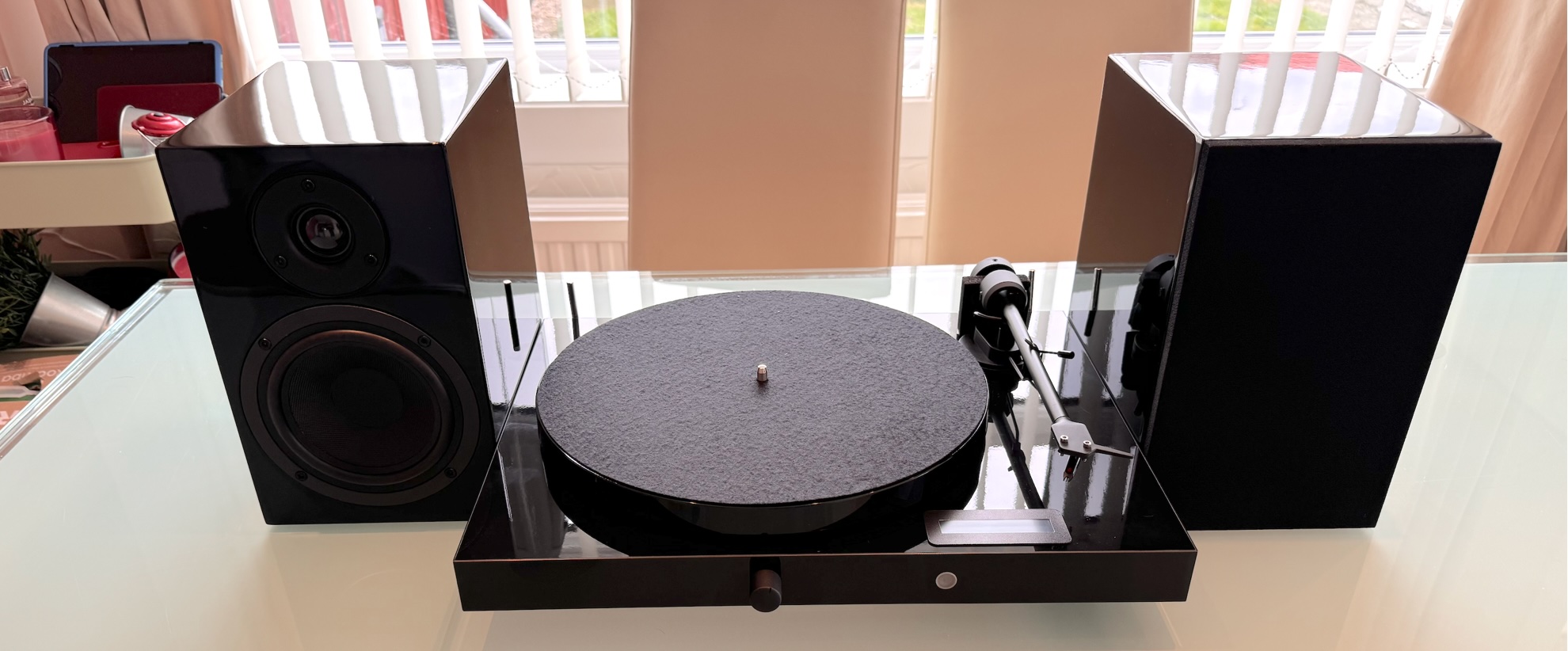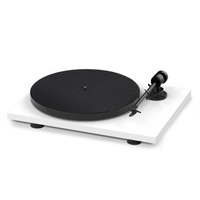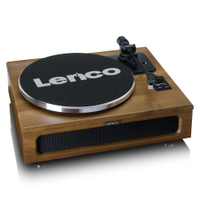TechRadar Verdict
The Pro-Ject Juke Box E1 is an excellent all-in one record player with a 2x50W Class D amplifier inside; all you need to add is speakers. In addition to delivering a warm and inviting audio performance, it can also stream from your phone and connect to an external audio source via line-in. It's a good turntable for the price and you'll struggle to get separates of the same quality without spending more, but obviously you don't get the flexibility to upgrade in the future here.
Pros
- +
Everything in one place
- +
Completely plug and play
- +
Excellent sound
Cons
- -
Not quite as pretty as a plain E1
- -
Bluetooth isn't as fun as vinyl
- -
Quite expensive
Why you can trust TechRadar
Pro-Ject Juke Box E1: two-minute review
The Pro-Ject Juke Box E1 is here to change the reputation of all-in-one record players. These have a poor reputation, largely because they're usually built to a very low price, with all the sacrifices that entails. The Juke Box E1 is not like this, because Pro-Ject hasn't built this for budget, it's built it for convenience. This isn't a cheap-o system, and it doesn't look, feel or sound like one either.
The Pro-Ject Juke Box E1 takes the familiar and good-looking Pro-Ject Primary E1 turntable and adds a built-in phono stage, amplification and Bluetooth receiver to deliver an all-in one sound system – just add speakers. Or grab the bundle that Pro-Ject offers with matching speakers.
If you already have a decent amp, then you'd be better off with one of the stand-alone Pro-Ject E1s, but as a one-box option among the best turntables for beginners who are starting from nothing, this is exceptionally simple to set up and use, and it delivers an impressive performance across all kinds of music.
At £599 / $799 / AU$999, this is not a super-cheap purchase, but you'd need to spend the same or even more to get a good-quality turntable and separate amplifier of the same level of quality, so it's fair value and compact, in that regard.
However, if you think you'll become more ambitious in the future, a standard Pro-Ject E1 and separate amp might be more future-proof, since you could replace one without swapping the other.
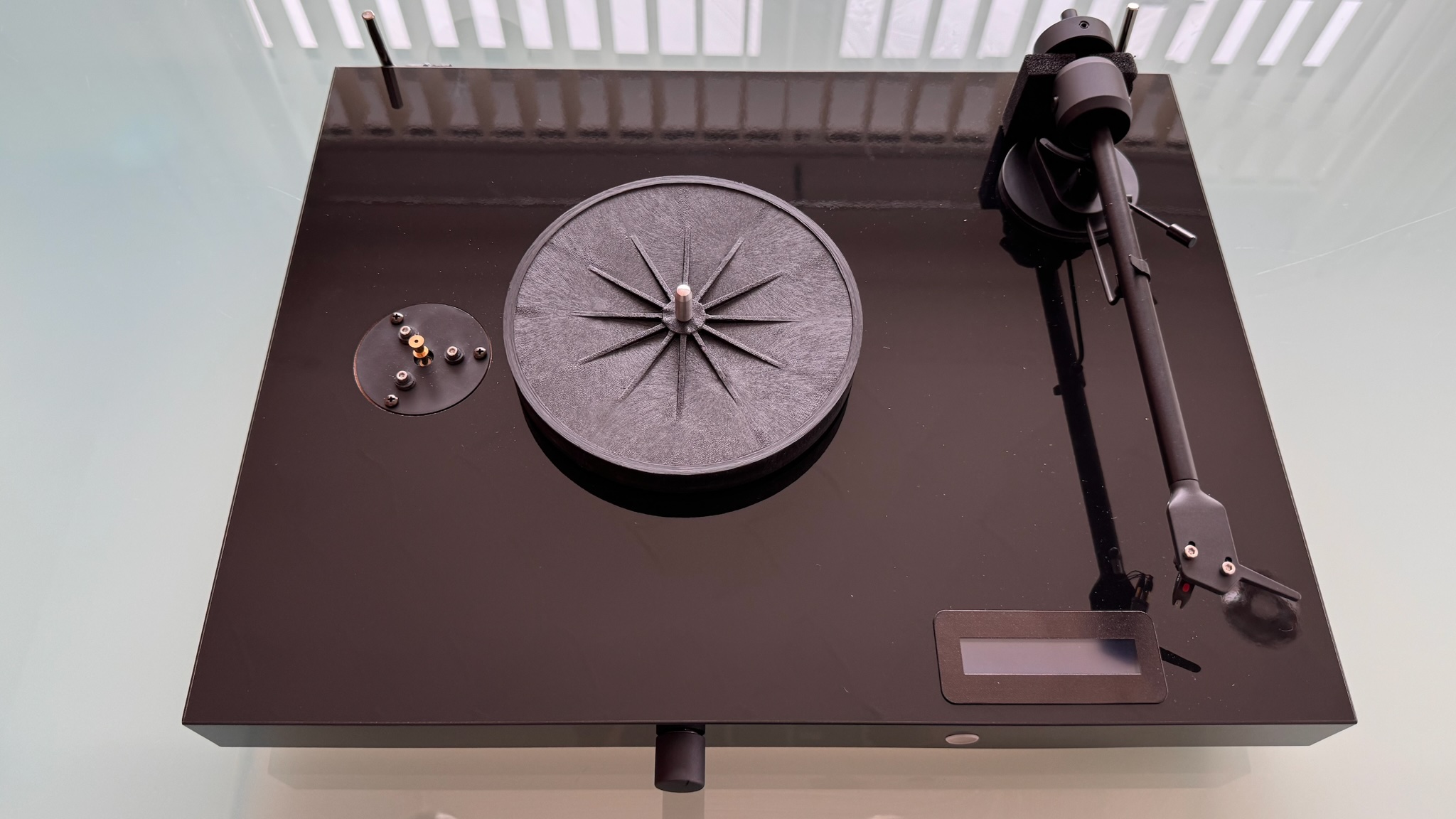
Pro-Ject Juke Box E1 review: price and availability
- Released in February 2024
- £599 / $799 / AU$999
- £799 / $1,199 / AU$1,566
The Pro-Ject Juke Box E1 is available as a stand-alone unit without speakers for £599 / $799 / AU$999, or you can buy it in a bundle with the matching Pro-Ject Speaker Box 5 set of stereo speakers for £799 / $1,199 / AU$1,566.
The price here is more expensive than most other all-in-ones, but it's targeted at a different kind of buyer – one who's got more interest in audio and component quality, but is perhaps short on space or would prefer to avoid the hassle of separates.
The Juke Box E1 is the successor to 2018's Juke Box E, and it was released in early 2024.
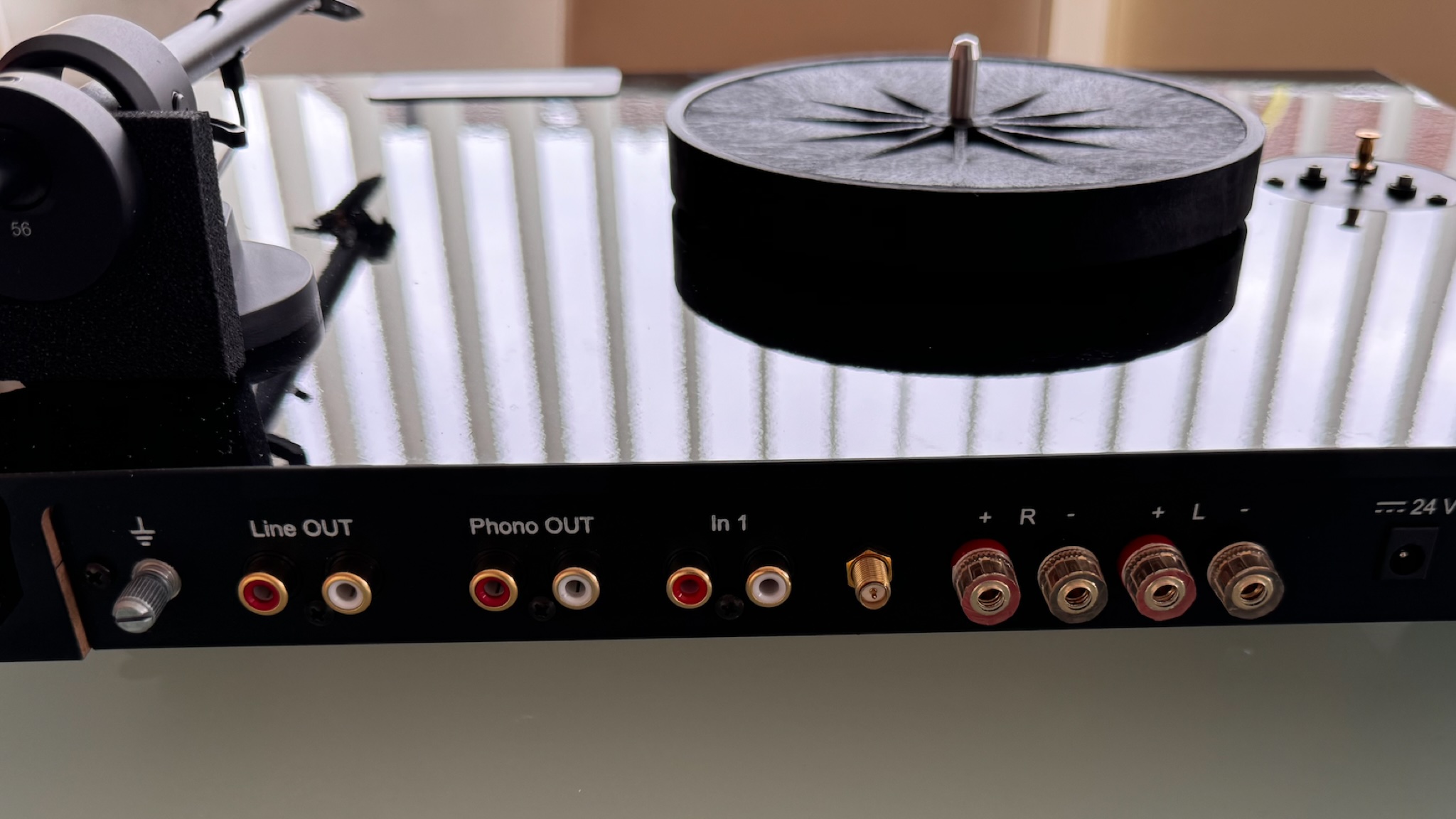
Pro-Ject Juke Box E1 review: Features
- Includes its own amp
- Can be used with external amps
- You can stream to it over Bluetooth
The Juke Box E1 comes with an Ortofon OM 5E cartridge, which is also used to excellent effect in the standard E1: it's a good all-rounder and easily upgradeable. But the most significant features are inside, where you'll find both an integrated phono stage and 2x50W of Class D amplification. That makes this a full hi-fi system: just bring or buy speakers, no separates required.
The platter here is belt-driven to reduce mechanical noise and in addition to the outputs there's a line in so that you can connect another sound source. You can also stream from your phone via Bluetooth.
As with the E1 there's no start/stop automation: you set and lift the tonearm manually.
- Features score: 4/5
Pro-Ject Juke Box E1: Audio performance
- Musical, involving and entertaining
- Decent bass and airy highs
- Can go fairly loud
Having previously tested the Pro-Ject E1 we had a good idea of what to expect here when we connected it to the same speakers as before: Pro-Ject's turntables are very musical, and the E1 with the Ortofon OM 5E performs very well with a wide range of genres including classic rock and electronic pop.
As with the E1, the sound stage was clear and detailed, offering excellent separation of instruments with a largely neutral performance and a bit of warmth. It's the sort of turntable that makes you smile involuntarily as you listen. Bass guitars are tight rather than rubber band-y, layered vocals and synth pads are well positioned and you'll often hear details that other turntables can't deliver quite so well. Lushly recorded music is a particular pleasure, but we had fun annoying the neighbors with noisy guitar rock too. It's a very enjoyable listen.
What's different this time, of course, is that the Juke Box has its own phono stage and amplification – and if you buy the bundle, its own speakers. The amp is rated 2x50W at 4 ohms, and I was impressed by its performance compared to an affordable standalone option.
Whether you're using Pro-Ject's speakers or bringing your own there's a noticeable difference in spaciousness if you're streaming a song over Bluetooth rather than listening to it on vinyl. That's Bluetooth's fault rather than the amp and speakers' fault, but it does feel like you're not making the most of what the Juke Box can do.
Pro-Ject's own speakers have a frequency range of 55Hz to 20kHz, which is decent for relatively small bookshelf-sized speakers like these and only marginally narrower than the 52Hz to 28kHz of the Bowers & Wilkins bookshelf speakers I normally test with.
Like the B&Ws, they're two-way speakers with bass reflex ports and benefit from careful placement: too far from a wall and they can lack bass; too close and there can be too much of it. I preferred the sound of my B&Ws using the same built-in amp, finding them to be slightly wider and more airy, but the Pro-Ject speakers are still very lively and entertaining.
- Audio score: 4/5
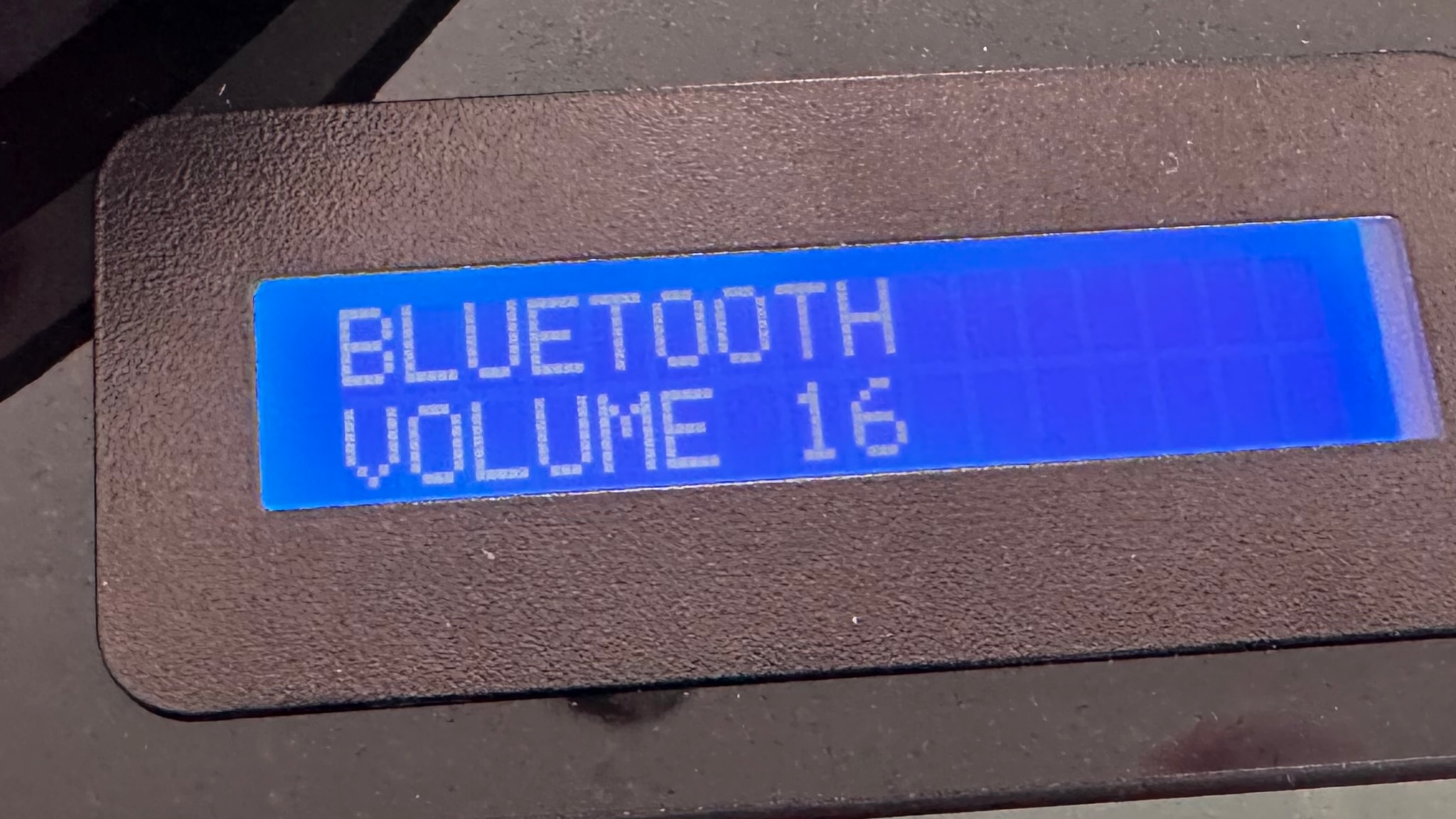
Pro-Ject E1 review: Design
- It's a Pro-Ject E1, but chunkier
- Still good-looking despite the added bulk
- Retains the zen design of its siblings
As the name suggests, the Pro-Ject Juke Box E1 has a lot in common with its sibling, the Pro-Ject E1 – but while they look very similar, the Juke Box is a little more chunky because it's not just a turntable. It also has a significantly larger power supply.
This is the latest generation of the firm's award-winning all-in one, and as before it provides everything you need to enjoy vinyl apart from the speakers (unless you opt for the bundle that includes stereo speakers). What's different from the previous version is that there's a new tonearm, a new drive system for the sub-platter, and a switch to toggle between 33 and 45rpm.
The Juke Box has the same belt-driven ABS anti-resonant platter as the regular E1, but it's in a slightly different place, presumably because the interior needed to be repositioned to make room for the amplification circuitry. As with the previous Juke Box, there's a small LCD display in one corner of the plinth to show the selected input and its volume, and as before it's on top so it's only visible if you're looking down on the turntable.
In order to achieve something close to the zen-like simplicity of the normal E1, the Juke Box has hidden some of its controls. The speed switch has been relocated to underneath the front of the plinth, and the on-off switch is on the underside too. Speaker, line in and out and power connectors are round the back. There's a single volume control on the front and the inputs are switched by pressing it or via the included remote control.
There are four finishes: glossy white, red or black, and a walnut wood grain effect. All come with a clear acrylic dust cover. The cover is in a normal place but opening it will knock the Bluetooth aerial out of position.
- Design score: 4/5
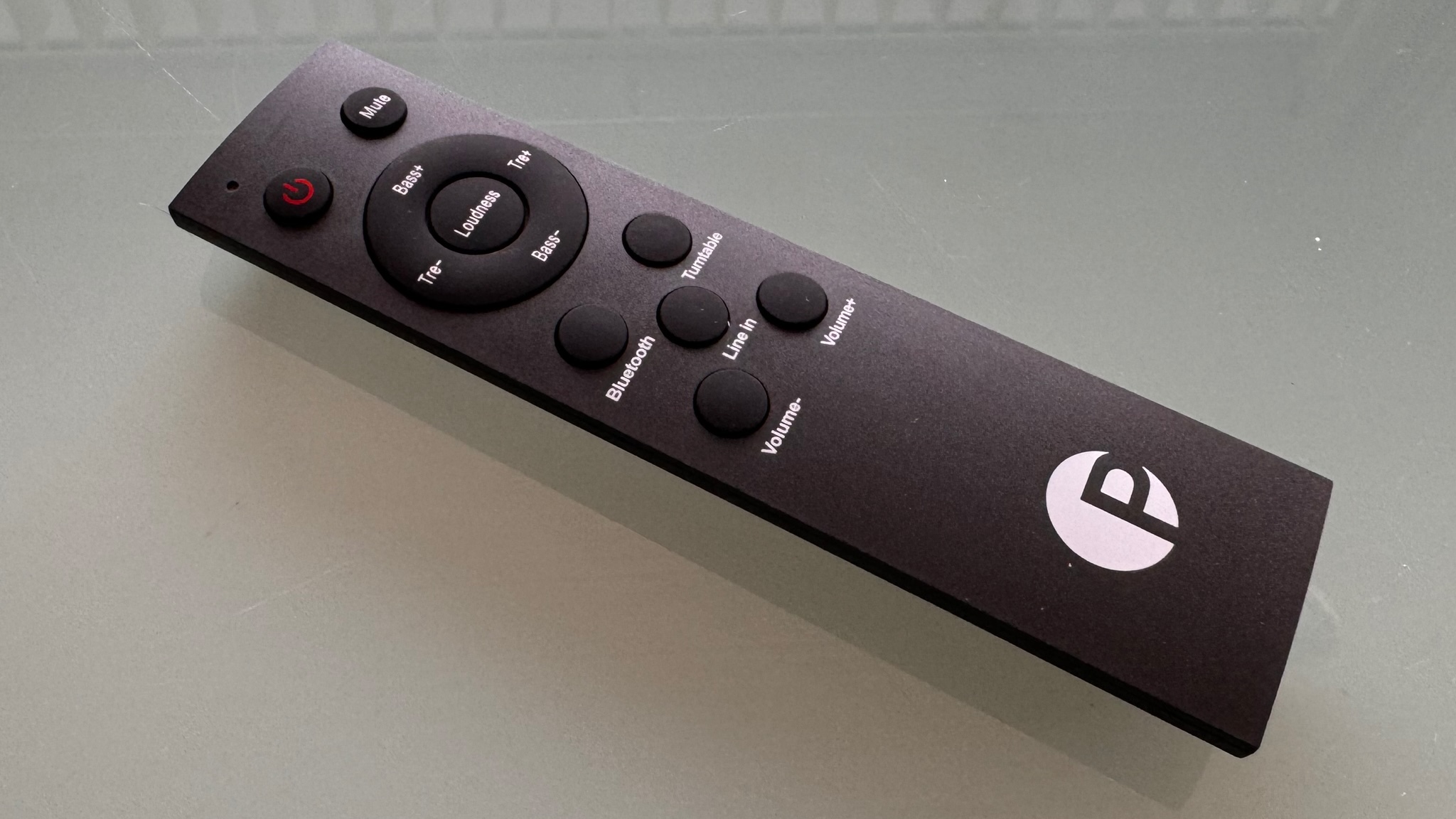
Pro-Ject Juke Box E1 review: Usability and setup
- Extremely user-friendly
- A small display shows input source
- Included remote control
The Pro-Ject E1 on which the Juke Box E1 is based is an extremely user-friendly turntable, and the same applies here but even more so: where the E1 still needed to be connected to an amp, the Juke Box has one inside it. As with the E1, the tonearm tracking force is factory pre-set, so it's just a matter of assembling the Juke Box, putting the belt on the pulley, adding the platter and slip mat and connecting your speakers.
The other main difference here is the display, which standard E1 doesn't have. It's simple and effective, showing the volume level and input source. You can control the volume with the control dial or press it to change inputs.
Really, the only usability thing missing here is automatic operation, which would certainly be a nice pairing with how generally great this is for beginners – but not everyone wants it, so it's not a real issue that it's missing.
- Usability score: 4.5/5
Pro-Ject Juke Box E1 review: Value
- A decent price for a turntable/amp combination
- Hard to find a good rival at this price
The Pro-Ject Juke Box E1 is roughly twice the street price of the regular Pro-Ject E1, but for that extra cash you're also getting a powerful amplifier. You'll really struggle to get a decent, separate amp for that amount of money, and of course an all-in-one is more convenient as it takes up less space. In that regard, this thing is excellent value – and having it be a Bluetooth receiver is the icing on the cake.
However, there's a question of the long-term value that it delivers because you obviously don't get any flexibility for future upgrades, if you think you'll want them. You can't swap the amp out for a more powerful one to pair with more capable speakers. You can't swap the turntable out for something with different options while keeping the amp.
If you don't think you'll need to make these changes in the future, or you just don't think you'll mind the cost, then no problem. But it does mean that the Pro-Ject Juke Box E1 is a double-edged sword when it comes to value – fantastic in the first instance, but with an issue as you get more ambitious.
- Value score: 4/5
| Attributes | Comments | Score |
|---|---|---|
| Features | Everything you need except the speakers. Pre-set tracking force and Bluetooth streaming add to the appeal. | 4/5 |
| Audio performance | Musical and lively with tight bass and good separation. Listening doesn't get tiring unless it's really loud. | 4/5 |
| Design | Inevitably chunkier than its siblings due to the integrated amp, but still a good-looking turntable with thoughtful design. | 4/5 |
| Usability and Setup | Incredibly simple to set up and operate. Remote control is handy. | 4.5/5 |
| Value | You'll struggle to get comparable separates for the same price, but obviously you can't replace just one part of it in the future. | 4/5 |
Buy it if...
You don't want separates
The Juke Box contains everything you need to play records apart from speakers, and Pro-Ject will happily sell you a set of those too.
You have eclectic tastes
The supplied Ortofon cartridge is a good option for all kinds of genres.
You appreciate style
Pro-Ject's turntables are beautiful things, even in this slightly more chunky size.
Don't buy it if...
You have a decent amp
The regular E1 model will be a better fit from this specific range.
You'll probably upgrade
If you think you might go down the audiophile road in future, separates offer better upgrading options.
You tend to lose things
The remote here is slim and easy to lose down the side of your chair.
Also consider
Pro-Ject E1
If want an affordable Pro-Ject option and have an amp already, then the amp-less sibling here, the E1, is an ideal option. It's super simple, it's warm and rich sounding, it's very well priced – and it comes in a version with a phono stage, or with Bluetooth, if you prefer. Here's our full Pro-Ject E1 review.
Lenco LS-410
We didn't exactly rave about this record player in our Lenco LS-410 review, but it one-ups the Pro-Ject by including speakers as well, so if you really want to save space and money, take a look.
Pro-Ject Juke Box E1: How I tested
- Used over several weeks across a ton of records and with streamed Apple Music
- Tested alongside the Pro-Ject E1
- Tested with Pro-Ject's optional speakers as well as the reviewer's own; tested with and without integrated amp
I tested the Pro-Ject Juke Box E1 at home over several weeks alongside its sibling, the Pro-Ject E1, connected through its own amplifier to both Pro-Ject's own bundled speakers and to my own Bowers & Wilkins bookshelf speakers.
I also connected the Juke Box to my Onkyo amp, bypassing the Juke Box's own integrated amplifier; as expected it sounded identical to the E1. For both turntables I listened intensely to albums I already know inside out across a wide range of genres from the most luscious yacht rock to rowdy punk and slinky electronic pop.
- First reviewed: July 2024
- Read TechRadar's reviews guarantee
Writer, broadcaster, musician and kitchen gadget obsessive Carrie Marshall has been writing about tech since 1998, contributing sage advice and odd opinions to all kinds of magazines and websites as well as writing more than a dozen books. Her memoir, Carrie Kills A Man, is on sale now and her next book, about pop music, is out in 2025. She is the singer in Glaswegian rock band Unquiet Mind.
